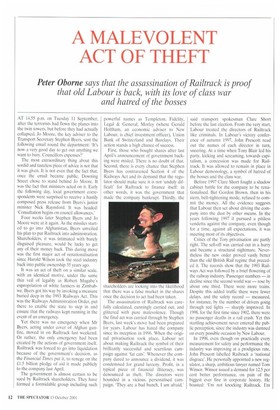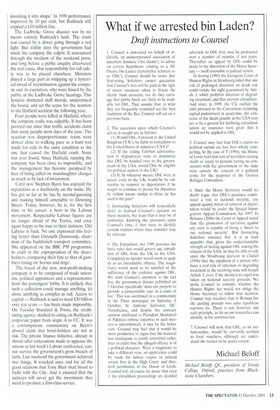A MALEVOLENT ACT OF THEFT
Peter °borne says that the assassination of Railtrack is proof
that old Labour is back, with its love of class war and hatred of the bosses
AT 14.55 p.m. on Tuesday 11 September, after the terrorists had flown the planes into the twin towers, but before they had actually collapsed, Jo Moore, the key adviser to the Transport Secretary Stephen Byers, sent the following email round the department: 'It's now a very good day to get out anything we want to bury. Councillors expenses?'
The most extraordinary thing about this sordid and tasteless piece of advice is not that it was given. It is not even that the fact that, once the email became public, Downing Street chose to stand behind Jo Moore. It was the fact that ministers acted on it. Early the following day, local government correspondents were surprised to receive a hastily composed press release from Byers's junior minister Nick Raynsford. It was headed: 'Consultation begins on council allowances.'
Four weeks later Stephen Byers and Jo Moore were at it again. As the missiles started to go into Afghanistan, Byers unveiled his plan to put Railtrack into administration. Shareholders, it was intimated with barely disguised pleasure, would be lucky to get any of their money back. This daring move was the first major act of renationalisation since Harold Wilson took the steel industry back into public ownership 35 years ago.
It was an act of theft on a similar scale, with an identical motive, under the same thin veil of legality as Robert Mugabe's expropriation of white farmers in Zimbabwe. Byers got his way by invoking a measure buried deep in the 1993 Railways Act. This was the Railways Administration Order, put there to enable the state to step in and ensure that the railways kept running in the event of an emergency.
Yet there was no emergency when Mr Byers, acting under cover of Afghan gunfire, moved in on Railtrack last weekend. Or rather, the only emergency had been created by the actions of government itself. Railtrack was forced to go into liquidation because of the government's decision, as the Financial Times put it, to renege on the £1.5 billion pledge of aid it made publicly to the company last April.
The government is almost certain to be sued by Railtrack shareholders. They have formed a formidable group including such powerful names as Templeton. Fidelity, Legal & General, Morley (where Gerald Holtham, an economic adviser to New Labour, is chief investment officer), Union Bank of Switzerland and Barclays. Their action stands a high chance of success.
First, those who bought shares after last April's announcement of government backing were misled. There is no doubt of that. Second, there is every chance that Stephen Byers has contravened Section 4 of the Railways Act and its demand that the regulator should make sure it is not 'unduly difficult' for Railtrack to finance itself: in other words, it was the government that made the company bankrupt. Thirdly, the shareholders are looking into the likelihood that there was a false market in the shares once the decision to act had been taken.
The assassination of Railtrack was carefully calculated, cunningly carried out, and glittered with pure malevolence. Though the final act was carried through by Stephen Byers, last week's move had been prepared for years. Labour has hated the company since its inception in 1996. When the original privatisation took place, Labour set about making Railtrack the symbol of their brilliantly successful and scurrilous campaign against 'fat cats'. Whenever the company dared to announce a dividend, it was condemned for grand larceny. Profit, in a typical piece of financial illiteracy, was denounced as theft. The directors were hounded in a vicious, personalised campaign. 'They are a bad bunch, I am afraid,' said transport spokesman Clare Short before the last election. From the very start, Labour treated the directors of Railtrack like criminals. In Labour's victory conference of autumn 1997, John Prescott read out the names of each director in turn, sneering. At a time when Tony Blair led his party. kicking and screaming, towards capitalism, a concession was made for Railtrack. It was allowed to remain in place in Labour demonology, a symbol of hatred of the bosses and the class war.
Before 1997 Clare Short fought a shadow cabinet battle for the company to be renationalised. But Gordon Brown, then in his stern, belt-tightening mode, refused to commit the money. All the evidence suggests that Labour then set about driving the company into the dust by other means. In the years following 1997 it pursued a pitiless vendetta against the company, even though for a time, against all expectations, it was meeting most of its objectives.
Critics of the Tory privatisation are partly right. The sell-off was carried out in a hurry and became a structural nightmare. Nevertheless the new order proved vastly better than the old British Rail regime that preceded it. The records show that the 1993 Railways Act was followed by a brief flowering of the railway industry. Passenger numbers — in decline since the second world war — rose by about one third. There were more trains. Despite this added traffic there were fewer delays, and the safety record — measured, for instance, by the number of drivers going through red lights — sharply improved. In 1998, for the first time since 1902, there were no passenger deaths in a rail crash. Yet this startling achievement never entered the public perception, since the industry was damned on every possible occasion by New Labour.
In 1998, even though on practically every measurement for safety and performance the industry was improving at a prodigious rate, John Prescott labelled Railtrack a 'national disgrace'. He personally appointed a new regulator, a sharp, ambitious lawyer named Tom Winsor. Winsor issued a demand for 12.5 per cent better performance, on pain of the biggest ever fine in corporate history. He boasted: `I'm not knocking Railtrack. I'm knocking it into shape.' In 1999 performance improved by 10 per cent, but RaiItrack still copped a £10 million fine.
The Ladbroke Grove disaster was by no means entirety Railtrack's fault. The crash was caused by a driver going through a red light. But within days the government had made the company the culprit. It announced through the medium of the weekend press, and long before a public enquiry discovered the real cause, that responsibility for rail safety was to be placed elsewhere. Ministers played a large part in whipping up a hysterical mood of recrimination against the company and its executives, who were hissed by the public at the Latibroke Grove hearings. This hysteria shattered staff morale, undermined the board, and set the scene for the reaction to the Hatfield accident the following year.
Four people were killed at Hatfield, where the company really was culpable. It has been pointed out since that traffic accidents claim that many people most days of the year. The reaction was disproportionate: trains were slowed close to walking pace as a hunt was made for rails in the same condition as the one that caused the Hatfield crash. None was ever found. Since Hatfield, running the company has been close to impossible, and the management has become paralysed by fear of being jailed on manslaughter charges as much as by lack of investment.
Until now Stephen Byers has enjoyed the reputation as a mediocrity on the make. He has got as far as he has by second-guessing and making himself amenable to Downing Street. Today, however, he is, for the first time in his career, a hero in the Labour movement. Respectable Labour figures are no longer afraid of the Tories, and once again happy to be true to their instincts. Old Labour is back. No one expressed this feeling better than Gwyneth Dunwoody, chairman of the backbench transport committee. She appeared on the BBC PM programme to exult in the expropriation of the shareholders, comparing their fate to that of gamblers losing on 'horses and dogs'.
The board of the new, non-profit-making company is to be composed of trade unionists, political appointees and a representative from the passengers' lobby. It is unlikely that such a collection could manage anything, let alone anything as complex as rail. Access to capital — RaiItrack is said to need £30 billion over ten years — has been made impossible. On Tuesday Standard & Poors, the creditrating agency, slashed its rating on Railtrack's corporate paper from single A to CC. It was a contemptuous commentary on Byers's absurd claim that bond-holders are not at risk. The private finance initiative, already in shreds after concessions made to appease the unions at last week's Labour conference, can not survive the government's gross breach of faith. Last weekend the government achieved two things. It wrecked once and for all the good relations that Tony Blair shed blood to build with the City. And it ensured that the railways will never get the investment they need to produce a first-class service.



























































































 Previous page
Previous page